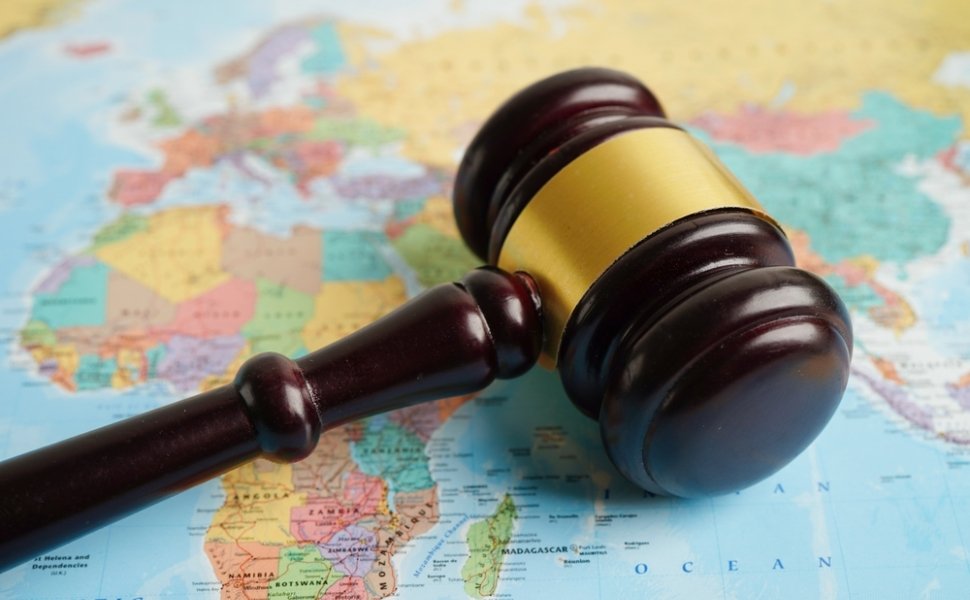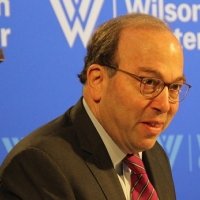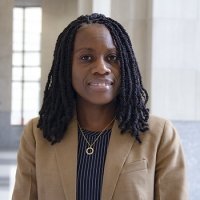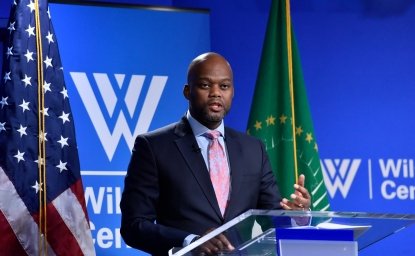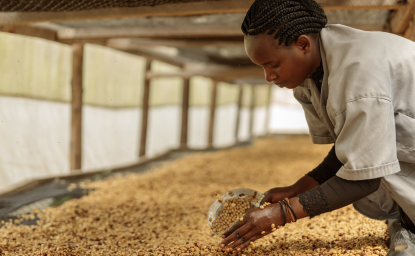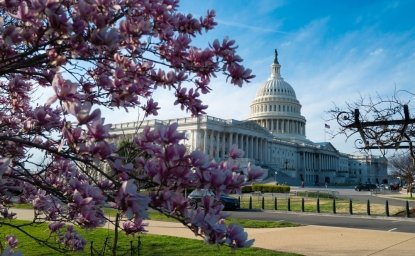This transcript has been lightly edited for length and clarity.
Glad to welcome you back to "Beyond a Single Story" and our first season focusing on the African Growth and Opportunity Act, AGOA. My name is Oge Onubogu, I'm the director of the Wilson Center Africa program and I'm joined today by my co-host and Africa program advisory council member, Witney Schneidman. Last week, Witney and I looked at the evolution of AGOA from its enactment in 2000 to today. We discussed how duty-free access of African products to the US market has increased trade between the US and African countries and helped create businesses across Africa and in the US.
Yet, with AGOA set to expire in September 2025, the road to reauthorization still remains unclear. This week, we are excited to dive deeper into the history of AGOA, learn more about the initial thinking behind it, and get insights from one of the key architects of the original AGOA legislation as to where we should go from here. I am so pleased to welcome Rosa Whitaker to the program.
Rosa serves as president and CEO of the Whitaker Group, a leading investment firm specializes in corporate strategy, transaction advisory, and project development for businesses in Africa. As the first ever Assistant US Trade Representative for Africa, Rosa served in the Clinton and Bush administrations and played a crucial role in developing the original AGOA legislation. Over the past several decades, Rosa has driven significant and sustained investment into Africa. And now we are glad to bring you our conversation with Rosa. Rosa, it is such a pleasure to have you on our show today. Welcome.
Thank you, I'm so glad to be here.
Well, we are delighted to have you on this show. So let's dive right into it. You've been around since the beginning of We talk about AGOA today, but folks like you, we're at the inception of this conversation. Can you share your thoughts with us on what was the thinking behind the original passage of AGOA? What informed this program?
That's a very good question, because a lot of people don't realize that AGOA's birth started with the birth of the transition of the GATT, the General Agreement on Trade and Tariffs, and through the WTO. So of course, the US had prioritized expanding the membership of the WTO, countries that would agree to be part of this new multilateral trade organizations. And we received a lot of resistance from Africa with good reason.
And I recall that conversation really was a key catalyst in helping us on the US side to reflect that we did not have a trade policy or trade law covering Africa. We had one for every region of the world except Africa. And so I think many of us listened. And I had already seen some of the trade challenges as a career diplomat sitting in Côte d'Ivoire, where we had just basically trade disincentives, and we treated African countries just as a part of charity, and not as potential trading partners.
But Rosa, you were in the US Embassy in Abidjan, how did you get to the Hill to work for Charlie Rangel, which became so central to the emergence of AGOA?
Witney, that's a very good question. I mean, because there's a very good and concise story behind it. Prior to joining the Foreign Service, I had worked for the Congressional Black Caucus where I met Charlie Rangel. And When I was sitting in Abidjan as the economic officer, my first task was doing what we call a demarsion. That means we have to come into the government to make a request on behalf of the United States. I made the request that the Côte d'Ivoire joined the WTO, and I was immediately given all the reasons why they would not, and how trade had in fact disadvantaged not only Côte d'Ivoire, but the rest of Africa. When I looked at my talking points, I said, "Oh my goodness, Washington has given me a script I can't read because I was agreeing with them." They had tariff peaks, tariff escalations. That means if you export primary and raw products to the US, zero tariffs at that time, but if you added any value to it, you had escalating tariffs. Trade was very limited, you know, PL480, where we were just kind of dumping some of our agricultural products, they had no reasons to join the WTO. And then I started seeing it I saw failed US aid programs, so seeing all of this, you know, I am a seasoned Washingtonian and I know that as a career diplomat, I can't change the law.
So then I just came back to Washington and I found Charlie Rangel and I just asked him, "Can I come to your office?" You have the power to arrange a transfer for me to work on developing America's first trade law towards Africa. I had met, by the way, Mike McDermott's chief of staff, Mike Williams in Cote d'Ivoire. He was already working on the kind of draft and thinking of AGOA. So we were of like minds. And so that is how I ended up with someone that I respect and admire to this day, my hero, Charlie Rangel, who, as you know, was strategically positioned on the Ways and Means Committee. And we got to work.
- You know, one of, I've always done many things, but one of the things that it has achieved is this bipartisan consensus in Congress that the US has investments in Africa worth investing in. How did you and Mike Williams and Congressman Rangel put together that bipartisan consensus at a time when there was not when it came to Africa?
You know, you have a very good sense of history because as you will recall, there was so much bipartisan bickering at that point. Like they weren't agreeing on anything and asking, at that time, Congressman Jim McDermott to come together with Newt Gingrich, the speaker, and I think there were investigations, there were insults going back and forth.
But you know, what we found is at the staff level, we all had credibility with our members, and there was a unity of wanting what was best for America. Now, a lot of the motivations were different, as you know. The Republicans, our argument was, at that time, very much free trade and say, why is trade good for everyone around the world except Africa? The Republicans were not big on aid. And then with the Democrats, we pointed to the exclusion of Africa from US trade policy. We have everyone for trade, except Africa. And we also talked about the marginalization of Africa.
But what really helped is, before we even got there, we found light mines in Africa. And we've had through AU and, you know, the SADC, Kama Bende, you know, I mean, and others. We have about five or six like minds in Africa, and of course, people like you. So we came together as a united front with some with different motivations. Some, we didn't agree on anything else but Africa, but it made sense.
Oge, I remember those early days, those meetings with Rosa and Mike on the Hill that you were reaching out to so many different constituencies, some of the private sector, even the spiritual, the faith community, and just really mobilizing a very broad effort to get this new vision for the US relationship with Africa embraced by as many individuals and sectors as possible, so it would pass as a new law.
- Well, you know, Witney, I started my career. Most people don't know this. I started my career as a community activist, and I am a multi-generational Washingtonian. So the optimism that I had about all of this is that I had seen tough things get done in Washington. And I also believe that you can only do those tough things by broad-based coalitions. And we managed, if you remember, first time it ever happened in history. We had a press conference meeting in the Senate chambers with Republican Senator Roth and black preachers because we had, you remember, Lorenzo I'm coordinating black peaches. And we had to go to them almost church by church, organization by organization. And what moved them is we broke down the importance of trade, trade to job creation, trade to livelihoods.
And they were moved by the fact that we had secured by then the support of all 48 countries in Sub-Saharan Africa. So our position is like, this is a new historical thing. It is very important and let's meet this moment together and let's not wake up on the wrong side of history. Now we still had some holdouts. And you remember, a lot of the senators told us dead on arrival, especially because we would not compromise on including duty-free and, at that time, quota-free privileges for apparel. The US had lost more than millions of jobs in the apparel sector. They were like, "We're not losing anymore." So we had to win the day. We brought in the private sector. We brought in some of the smartest people to show them that there would not be one job leaving North Carolina that's going to move to Lesotho, that what we were really talking about is trade diversion out of China, because even at that time, the US could not produce a pair of jeans that could retail at $12. Only China could do that. And we said, if Africa has given a chance, it would be able to do that, And it has proven it could do that. So those were the various arguments and everybody had different motivations, but thank God, we all came together.
If I could just, you know, pick up on the point that where you made, you know, difficult things get done and we're able to get difficult things done when we build consensus, when people come together, you were able to and the coalition and the consensus that you built push this idea, make sure that there was buy-in for this initiative, this program, AGOA.
Now, fast forward when we get to a point of reauthorization. And we are at that point now, again, where we're having these conversations about AGOA reauthorization. We'd love to hear about your experiences in 2015 when you all pushed for reauthorization. How were you able to build that consensus, how were you able to bring different voices together to the table to reinforce the argument of why this program was in the best interest of America and of Africa? You know, Oge, that's why it is very important to fight the good fight the first time.
Because the second time and the third time, We basically relied on the same bipartisan coalition that we had before. It was a bipartisan coalition, not only within the Congress, but also within the American public, because we did the work. People don't think they think AGOA just happened. It was almost five years of work. We took AGOA. We did town hall meetings in key congressional districts where we found opposition. It was like a political movement and it's largely volunteer, you know, strategic communications people. We said, you know, and Africa joined us. We want partnership over paternalism. And so we relied on that. And the most important thing we by then had a demonstrated record of achievement under goal.
We could talk about the millions of jobs that have been created in Africa directly and indirectly. We could talk about the jobs that even had been created in the US. We could talk about the diversification of as well as the increase in US Africa trade. We could talk about the fact, even if you want to go to the granular level, about 85 % of those apparel jobs were held by women. And we could show where when women have jobs, they make different decisions that women, we could bring those women and we brought them to the US sometimes.
They were sending their girls to school as well as their boys to school. So, we had a record by then, and I think that we had a record on trade, we had a record on transformation. Of course, people pointed to some of the weaknesses in AGOA, well, what it didn't do. But what really helped us is AGOA cost practically nothing. The cost to the US taxpayers was nominal, nominal. And yet, we were able to generate this kind of return, and we juxtapose AGOA's record against aid. The rest is history. So, Rosa, here we are nearly 25 years later. And I just have to ask you the question, has it lived up to your expectations? Well, I think that it depends. So, it hasn't, it hasn't.
When I look at the investment, nominal investment, it didn't increase our deficit. It cost the US practically nothing, right? It has exceeded my expectations in many ways because I'm looking at, you know, when I look at $500 billion in African exports to the US, I look at the comparison at that time before Goa started, we were exporting $355 million in garments from Africa to the US. And now that's about a billion dollars when we looked at the job creation.
For nothing, when you just look at it, the diversification, you know, I mean, where was our diversification of trade? Oil was dominating everything, It's still is, but now we hover between $3 to $5 billion in non-oil exports from Africa into the US. Now, had we invested more, we would have gotten more. And the fact that people say, "Well, there are only about seven countries exporting under AGOA," that's a bit of a disappointment because I did surmise that with these incentives that more countries would be export ready. But I still think we made a good decision to keep AGOA open to as many countries as possible, even if they were not in a position to use it, because you don't want to be picking winners and users. That's part of paternalism. And I believe, have we invested more in Witney, you know, have we gotten more? We did not get the investment incentives. We asked for OPEC to be reformed to include equity authority. We just got that years later.
So I just thought that we also needed more tariff relief, for anybody to think that you're going to get whole cell transformation in Africa or any emerging economy with tariff relief and market access, no, you need one, their supply side constraints. And that is because, you know, Africa hasn't done what it needs to global aid and US aid has not done what they need to do, so we have supply-side constraints, and we also didn't get an investment response. I was talking to a CEO of an apparel company who's looking to move diversify sourcing out of China, as a lot of them are doing, which is good for Africa, maybe.
I just shudder to think that with the kind of numbers he was talking about, Africa still doesn't have the capacity to do that. You know, we put in there what we called a cap on how much third country fabric can be used in the apparel production. How much fabric can Africa import from China and other countries to make the garment, very key. And the reason why we even allow that is because Africa did not have the capacity to produce fabric in commercial quantities. And I had thought by now we would have gotten that. And so these are the things that if we had a more holistic AGOA, with some more money, working in stronger partnership, creating a global supply chain with Africa fully integrated.
I believe we would be well on our way. And that's why, as you know, I am not calling for a reauthorization of AGOA. I'm calling for a reauthorization and modernization. AGOA needs to be enhanced. You know, as we talk about AGOA reauthorization and modernization, one of the drives behind this podcast is that there are different stories. And it's important for us to hear the different stories, hear the different angles at which we approach this issue. And I'm glad that you mentioned that, you know, there are voices, even some voices on the continent that may not be in support of AGOA. But at the end of the day, it's a matter built in that broad coalition?
- Just one last question. So Rosa, once again, you're in the engine room of renewal and modernization. You've put together a coalition. You've brought Afriexim Bank into the equation. What's your sense on what's gonna happen in the new Congress? We have a new administration. Donald Trump just got elected. What's your sense going forward?
I am optimistic surprisingly, because President Trump supported AGOA during the last presidency. He's competing with China, a US national security and economic priority, and some of the people around town that they are talking to about coming into the African seats, they are very strong people on Africa. Now, I don't know who's going to eventually sit in those seats. I think we did it before. We can do it again with the right kind of support. We don't need to agree on everything. We just need to agree on some things.
Thank you so much, Rosa. I really can't think of a better note to end this conversation on, but on that note of optimism. So, really, thank you so much for joining us for this conversation.
With that, thank you for joining us on the second episode of this season of Beyond a Single Story. Next week, we'll begin going deeper on the impact of AGOA on businesses in the US and in African countries. We'll be hearing the stories and experiences from two accomplished figures in the US Africa business space, Vanessa Adams and Jas Bedi. Please subscribe to our channel wherever you get your podcasts to make sure you never miss an episode of Beyond a Single Story.
Special thanks to the production team that made this series possible. This episode was produced by Aaron Stanley and Nathaniel Oakes. Technical assistance was provided by Shaarona Harris and editing was done by Brian Prevost. The views expressed by guests of the podcast are their own and do not necessarily represent the views of the Wilson Center Africa program. The Africa program is part of the Wilson Center, a congressionally chartered tank tank that provides insights on global affairs to policymakers and the public through deep research, impartial analysis and independent scholarship.

